大学英语2 第二单元
全新版大学进阶英语综合教程2 第二单元单词语法

Language Focus一、Text生词exchange:v. give to and receive from one another 交换e.g. The students exchanged gifts at the end of the New Year’s party.新年晚会临近结束时,学生们相互交换了礼品。
bring oneself to do sth.: force oneself to do sth. 强迫或促使自己做某事e.g. My friend is a perfect gentleman and he would never bring himself to say nasty things about others.我朋友是位十足的绅士,从不对人恶语相向。
retired:a. no longer active in one’s work or profession 退休的e.g. Many retired people live a wonderful life.不少退休人员活得很精彩。
correspondence:n. communication by exchange of letters; letters exchanged 通信,往来书信e.g. It’s not easy to keep correspondence with people for long.跟人保持长期通信不是件容易事。
overwhelm:vt. overcome completely in mind or feeling 压倒,使难以承受e.g. Jenny is a very determined girl and no difficulty will overwhelm her.简妮是个意志坚强的女生,没有什么困难能难倒她。
dominate:v. be in control 控制,支配e.g. Reporting of the terrorist attack dominated today’s news media around the world.今天世界各国的新闻媒体都大量报道了这一恐怖袭击活动。
全新版大学英语第二版综合教程2第二单元课文翻译
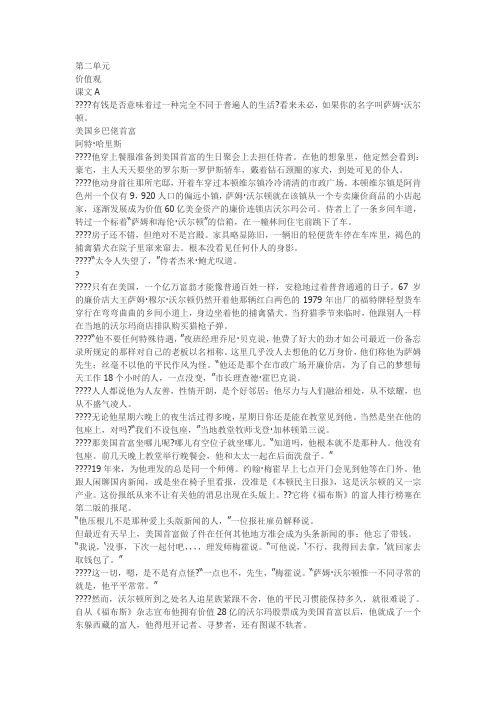
第二单元价值观课文A有钱是否意味着过一种完全不同于普遍人的生活?看来未必,如果你的名字叫萨姆·沃尔顿。
美国乡巴佬首富阿特·哈里斯他穿上餐服准备到美国首富的生日聚会上去担任侍者。
在他的想象里,他定然会看到:豪宅,主人天天要坐的罗尔斯一罗伊斯轿车,戴着钻石颈圈的家犬,到处可见的仆人。
他动身前往那所宅邸,开着车穿过本顿维尔镇冷冷清清的市政广场。
本顿维尔镇是阿肯色州一个仅有9,920人口的偏远小镇,萨姆·沃尔顿就在该镇从一个专卖廉价商品的小店起家,逐渐发展成为价值60亿美金资产的廉价连锁店沃尔玛公司。
侍者上了一条乡间车道,转过一个标着“萨姆和海伦·沃尔顿”的信箱,在一幢林间住宅前跳下了车。
房子还不错,但绝对不是宫殿。
家具略显陈旧,一辆旧的轻便货车停在车库里,褐色的捕禽猎犬在院子里窜来窜去。
根本没看见任何仆人的身影。
“太令人失望了,”侍者杰米·鲍尤叹道。
只有在美国,一个亿万富翁才能像普通百姓一样,安稳地过着普普通通的日子。
67岁的廉价店大王萨姆·穆尔·沃尔顿仍然开着他那辆红白两色的1979年出厂的福特牌轻型货车穿行在弯弯曲曲的乡间小道上,身边坐着他的捕禽猎犬。
当狩猎季节来临时,他跟别人一样在当地的沃尔玛商店排队购买猎枪子弹。
“他不要任何特殊待遇,”夜班经理乔尼·贝克说,他费了好大的劲才如公司最近一份备忘录所规定的那样对自己的老板以名相称。
这里几乎没人去想他的亿万身价,他们称他为萨姆先生;丝毫不以他的平民作风为怪。
“他还是那个在市政广场开廉价店,为了自己的梦想每天工作18个小时的人,一点没变,”市长理查德·霍巴克说。
人人都说他为人友善,性情开朗,是个好邻居;他尽力与人们融洽相处,从不炫耀,也从不盛气凌人。
无论他星期六晚上的夜生活过得多晚,星期日你还是能在教堂见到他。
当然是坐在他的包座上,对吗?“我们不设包座,”当地教堂牧师戈登·加林顿第三说。
全新版大学英语2-第二单元A-Life-Full-of-Riches
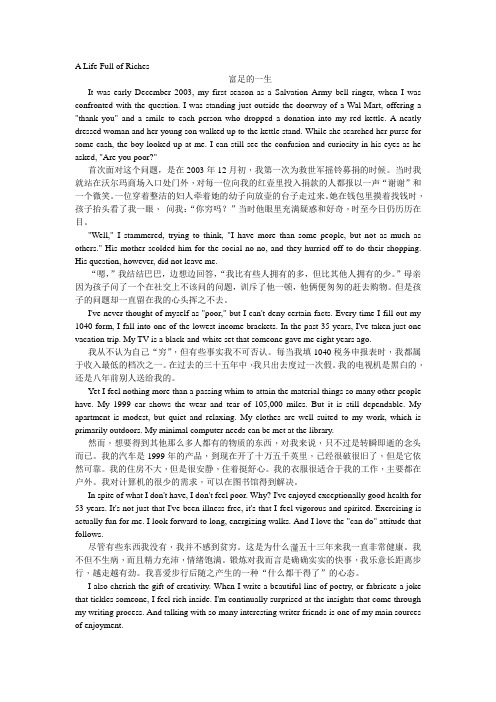
A Life Full of Riches富足的一生It was early December 2003, my first season as a Salvation Army bell ringer, when I was confronted with the question. I was standing just outside the doorway of a Wal-Mart, offering a "thank you" and a smile to each person who dropped a donation into my red kettle. A neatly dressed woman and her young son walked up to the kettle stand. While she searched her purse for some cash, the boy looked up at me. I can still see the confusion and curiosity in his eyes as he asked, "Are you poor?"首次面对这个问题,是在2003年12月初,我第一次为救世军摇铃募捐的时候。
当时我就站在沃尔玛商场入口处门外,对每一位向我的红壶里投入捐款的人都报以一声“谢谢”和一个微笑。
一位穿着整洁的妇人牵着她的幼子向放壶的台子走过来。
她在钱包里摸着找钱时,孩子抬头看了我一眼,问我:“你穷吗?”当时他眼里充满疑惑和好奇,时至今日仍历历在目。
"Well," I stammered, trying to think, "I have more than some people, but not as much as others." His mother scolded him for the social no-no, and they hurried off to do their shopping. His question, however, did not leave me.“嗯,”我结结巴巴,边想边回答,“我比有些人拥有的多,但比其他人拥有的少。
全新版大学英语2-第二单元A-Life-Full-of-Riches
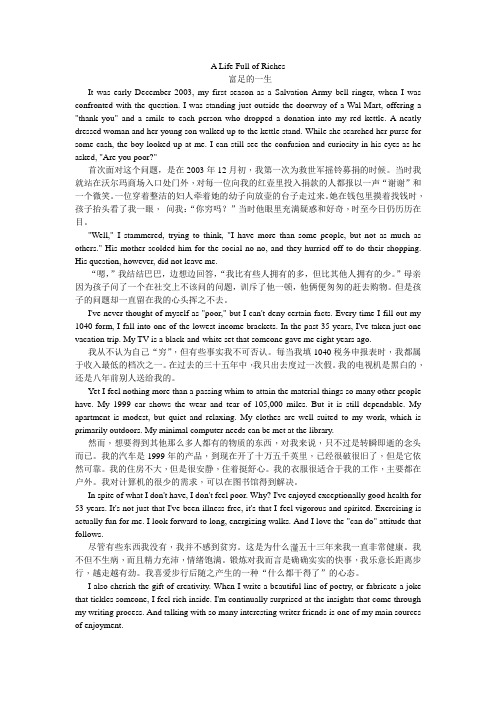
A Life Full of Riches富足的一生It was early December 2003, my first season as a Salvation Army bell ringer, when I was confronted with the question. I was standing just outside the doorway of a Wal-Mart, offering a "thank you" and a smile to each person who dropped a donation into my red kettle. A neatly dressed woman and her young son walked up to the kettle stand. While she searched her purse for some cash, the boy looked up at me. I can still see the confusion and curiosity in his eyes as he asked, "Are you poor?"首次面对这个问题,是在2003年12月初,我第一次为救世军摇铃募捐的时候。
当时我就站在沃尔玛商场入口处门外,对每一位向我的红壶里投入捐款的人都报以一声“谢谢”和一个微笑。
一位穿着整洁的妇人牵着她的幼子向放壶的台子走过来。
她在钱包里摸着找钱时,孩子抬头看了我一眼,问我:“你穷吗?”当时他眼里充满疑惑和好奇,时至今日仍历历在目。
"Well," I stammered, trying to think, "I have more than some people, but not as much as others." His mother scolded him for the social no-no, and they hurried off to do their shopping. His question, however, did not leave me.“嗯,”我结结巴巴,边想边回答,“我比有些人拥有的多,但比其他人拥有的少。
大学英语听力b2_listening_unit_2_Communication
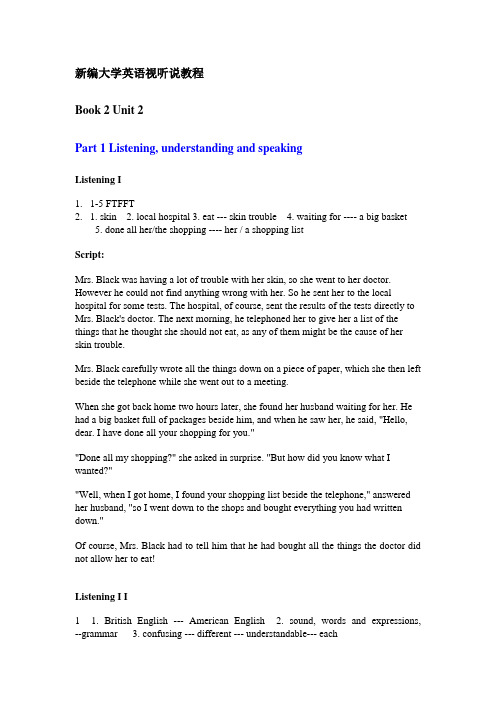
新编大学英语视听说教程Book 2 Unit 2Part 1 Listening, understanding and speakingListening I1.1-5 FTFFT2. 1. skin 2. local hospital3. eat --- skin trouble4. waiting for ---- a big basket5. done all her/the shopping ---- her / a shopping listScript:Mrs. Black was having a lot of trouble with her skin, so she went to her doctor. However he could not find anything wrong with her. So he sent her to the local hospital for some tests. The hospital, of course, sent the results of the tests directly to Mrs. Black's doctor. The next morning, he telephoned her to give her a list of the things that he thought she should not eat, as any of them might be the cause of her skin trouble.Mrs. Black carefully wrote all the things down on a piece of paper, which she then left beside the telephone while she went out to a meeting.When she got back home two hours later, she found her husband waiting for her. He had a big basket full of packages beside him, and when he saw her, he said, "Hello, dear. I have done all your shopping for you.""Done all my shopping?" she asked in surprise. "But how did you know what I wanted?""Well, when I got home, I found your shopping list beside the telephone," answered her husband, "so I went down to the shops and bought everything you had written down."Of course, Mrs. Black had to tell him that he had bought all the things the doctor did not allow her to eat!Listening I I1 1. British English --- American English 2. sound, words and expressions, --grammar 3. confusing --- different --- understandable--- each2. British EnglishI don’t know.What do you say?jumpertrouserschipschemist’s shopring them upHave you got an extra pen?Script:American and British people both speak English, of course, but sometimes it does not seem like the same language. In fact, there are some important differences between British and American English.First of all, they sound very different. Often, Americans don't say all the letters in each word. For example, Americans may say "I dunno" instead of "I don't know", or they may say "Whaddya say?" instead of "What do you say?"Sound is not the only difference between British and American English. The two languages have different words and expressions for some things. For example, some words for clothing are different. Americans use the word "sweater", but the British say "jumper". Americans wear "vests" over their shirts, but British people wear "vests" under their shirts. Americans talk about "pants" or "slacks", but the British talk about "trousers". The British chips are American French fries. A British chemist is an American drugstore. In Britain, if you are going to telephone friends, you "ring them up". In America, you "give them a call".There are also some differences in grammar. For example, Americans almost always use the helping verb "do" with the verb "have". They might say, "Do you have an extra pen?" The British often ask the question a different way. They might say, "Have you got an extra pen?"These differences can be confusing when you are learning English. But when the same language is used in different places, it is understandable that it changes in each place.Listening III11-6 T F F F F T21) small 2) pie 3) pine 4) big 5) small 6) pint 7) half 8) German9) warm 10) brown 11) English 12) a packet of 13) in the evening14) fried potatoes 15) crispsScript:Nick: Hi, Dieter. OK?Dieter: Oh, hi, Nick. Yes, I'm fine, except that I had a big problem ordering my drink.I didn't think my English was so bad!Nick: Your English is very good! What kind of problem?Dieter: Well, look at this beer I've got here—this warm, brown, English beer—it wasn't what I wanted!Nick: Why, what did you ask for?Dieter: Well, I just asked for a small beer. Then the barman asked what type of beer and said lots of names that I didn't understand—and something about a pie or a pine. I didn't understand anything!Nick: Oh, no! He probably said a pint! In English you don't ask for a big or a small beer. You ask for either a pint or a half. A pint's the big one.Dieter: So this one I've got here is a half?Nick: Yes, that's a half of bitter. Bitter's the name for that type of beer.Dieter: Ah, that's what he said—bitter! Well, it's very different from the beer we drink in Germany, I must say.Nick: Yes, I know. They call the German type of beer lager. So you have to ask for a half of lager, or a pint of lager.Dieter: OK. I understand that now. My another problem was chips. I asked for a packet of chips, and the barman said something strange—that they don't have chips in the evening, only at lunchtime. What did he mean?Nick: Yes, they have fish and chips, but I think you meant crisps. In England, chips are fried potatoes, you know, French fries. The ones you buy in a packet are crisps. Dieter: Well, in the end I didn't get anything to eat. So you see, I did everything wrong!Listening IV11-5 F T T F T2Examples: 1. MEN 2. HIS 3. MAN-madeConsequences: 1. mental image --- females/women 2. females/ women --- males/ men 3. citizensScript:(Mr. and Mrs. Jones are having a conversation one evening while Mrs. Jones happens to be looking at some of the textbooks her daughter, who is in the fifth grade, is using.)Mrs. Jones: Listen to what this book says. It really makes me angry! When talking about the settling of the western part of the U.S., it says, "MEN by the thousands headed west." Then on the very same page it says, "The average citizen in the United States is proud of HIS heritage."Mr. Jones: What's wrong with that? It's true. I don't understand why you are angry. Mrs. Jones: Why? Because women are left out!Mr. Jones: Everyone knows when the author says "men" or "his" in those sentences that the author means to include women.Mrs. Jones: I think you are wrong. When young people read these sentences, they simply do not form a mental image which includes females.Mr. Jones: Mm. Do you have other examples?Mrs. Jones: Yes I do! This book mentions "MAN-made improvements that have raised America's standard of living". A child will not think that females as well as males have made contributions when reading this.Mr. Jones: I still don't think it's very important.Mrs. Jones: Of course you don't! You're a man. But don't you want our daughter and other little girls to have the idea that they can be important citizens in their country, just as other women have been in the past?Mr. Jones: Well, I guess you're right. I hope not all textbooks are like that.Part 2 Viewing, understanding and speaking11-6 T F F F F T21) or another 2) seeing each other 3) boating 4) half an hour 5) someoneelse 6) anymore 7) Of course I do. 8) two different places 9) stupid Script:(The telephone rings in Julia's home, and she picks up the phone.)Julia: Hello!Michael: Hello, this is Michael.Julia: Hi, Michael. How are you?Michael: I'm fine. I miss you a lot though.Julia: Me, too. Can we get together again before you leave?Michael: Yes, sure! That's why I called you.Julia: Where should we meet?Michael: Mm, how about in front of Wanghu Hotel? (Some people are talking loudly in Julia's home.) That's not far from your home.Julia: Which hotel? I didn't hear you clearly.Michael: Wanghu Hotel.Julia: OK! What time?Michael: Mm, how about 12:30, tomorrow afternoon?Julia: OK, see you then.Michael: OK. OK, see you then.(In front of Wanghu Hotel, Michael is waiting. But Julia is waiting in front of Huanhu Hotel.)Michael: (He Looks at his watch, talking to himself.) It's 1:35 now! What's wrong with her?Julia: (She Looks at everywhere, hoping to see Michael, then talking to herself.) He's always late!Michael: (He Looks at his watch again, talking to himself.) Maybe she doesn't want to see me again?Julia: (She Looks at her watch, talking to herself.) It's almost 1:45 now! Where is he? Can it be that he is waiting at Wanghu Hotel? (Julia quickly rushes to Wanghu Hotel. There she sees Michael, who stands there waiting anxiously.)(In front of Wanghu Hotel.)Michael: Hi, Julia. You are so late. How come?Julia: I'm late?! I'm not late! I was waiting somewhere else! Believe it or not, I was waiting in front of Huanhu Hotel!Michael: Oh, my goodness! I've been waiting here for one hour. How come you went to Huanhu Hotel? I told you to come to Wanghu Hotel.Julia: But it sounded like Huanhu Hotel to me! You should've pronounced it more clearly.Michael: I'm sorry, but...but it never occurred to me you would have confused the two.Julia: I wish I'd realized that sooner, so that I wouldn't have waited there for so long. You know what? When you called yesterday, my mom had a group of friends over. They were so noisy that I could hardly hear you.Michael: That's why. Then how did you figure out that it might be here—Wanghu Hotel?Julia: Did it ever occur to you that we might be waiting at two different hotels? Michael: I guess not. I thought you were delayed by traffic or something.Julia: No! You don't think. Whenever we meet, we always have one problem or another.Michael: But last Saturday was all right. We had no trouble whatsoever seeing each other.Julia: It's always me who is waiting for you.Michael: That's not true! Wasn't I waiting for you today? And do you still remember the day when we went boating? I waited for you for about half an hour!Julia: If you don't want to wait for me, then wait for someone else.Michael: Julia, it's not that. You know what I mean.Julia: You just don't love me anymore.Michael: Of course I do. That's why I'm here. If I didn't love you, I wouldn't have waited here for an hour.Julia: But you never say "I love you" any more.Michael: Do you think I have to repeat the same three words all the time? Actions speak louder than words.Julia: But if you don't say it, how do I know?Michael: Come on, Julia. Don't be childish. Are we speaking the same language? It seems to me you always get me wrong.Julia: Well, if...if I hadn't realized what had happened we would still be waiting at two different places right now!Michael: Are you saying I'm stupid? Then why did you fall in love with me, then? Julia: Because I am even more stupid than you are! (Both laugh.)Michael: Now, let's forget it. Why don't we go for a walk in the park?Julia: Sure! (They walk away hand in hand.)Part 3 Video Appreciation and Singing for Fun1.Tip 1: Use open-ended questionsTip 2: Active listeningTip 3: The cocoonTip 4: Engage with the other personTip 5: Don’t make assumptionsTip 6: Avoid antagonistic sentences2. 1) closed questions 2) kill the conversation 3) summarizing 4) concentrate on 5) visualize a “cocoon”6) turn around and face that individual7) a particular topic 8) projecting your own thoughts or feelings9) a form of attack 10) a lot less conflictsPart 4 Further Speaking and ListeningListening I1) closer 2) regular 3) down 4) sense 5) envelope 6) convenience 7) instant 8) longer 9) positive 10) 2,252 11) quality 12) decreased 13) similar 14) inside 15) agreed 16) differentListening II1) status 2) definite 3) doubts 4) interrupt 5) power structure 6) establish and test 7) knowledge 8) power 9) sharing approach 10) encourageScript:At an early age, little girls' conversation is less definite and expresses more doubts, while little boys use conversation to establish status with their listeners.These differences continue into adult life. In public conversations, men talk more and interrupt other speakers more. In private conversations, men and women speak in equal amounts, although they say things in a different style. For women, private talking is a way to establish and test intimacy. For men, private talking is a way to explore the power structure of a relationship.Teaching is one job which shows the differences between men's and women's ways of talking. When a man teaches a woman, he wants to show that he has more knowledge, and hence more power in conversation. He uses his language to show this. When a woman teaches another woman, however, she is more likely to take a sharing approach and to encourage her student to join in.But it doesn't suggest that women are naturally more helpful. Actually, women feel they achieve power by being able to help others.Listening III1-5 F T F F TScript:Walking down the street, a dog saw an ad in an office window. "Help wanted. Must type 70 words a minute. Must be computer literate. Must be bilingual. Anequal-opportunity employer."The dog applied for the position, but he was quickly refused. "I can't hire a dog for this job," the office manager said. But when the dog pointed to the line that read "An equal-opportunity employer", the office manager sighed and asked, "Can you type?" Silently, the dog walked over to a typewriter and typed a letter without a mistake. "Can you operate a computer?" the manager inquired. The dog then sat down at a computer, wrote a program and ran it perfectly."Look, I still can't hire a dog for this position," said the office manager. "You have fine skills, but I need someone who's bilingual. It says so right in the ad."The dog looked up at the manager and said, "Meow."Listening IV1 1-6 T F T F T T2 1) an American education 2) fluent English 3) misses 4) nice5) little things 6) walking the dog 7) weather 8) snowy9) sunshine 10) boots 11) umbrella 12) a big smileScript:Ramon Romero is a seventeen-year-old boy from Bolivia. He speaks Spanish and a little bit of English.Ramon lives in the United States now, in Little Rock, Arkansas, with the Hutchinsons. They are not his real family. His real family is back in Bolivia. They cannot come to America because they have jobs and duties in their country and aren't able to leave. However, they do want their son to have an American education and be fluent in English.He misses his family and wishes to see them. It seems that no one understands his true feelings. It is difficult to listen to English all the time and then to express his thoughts in English. His American family is very nice to him and helps him in every way. In return, Ramon does little things to help the family. For instance, he takes the dog for a walk every morning and every evening.When he comes back from the morning walk, he tells Mrs. Hutchinson about the weather. This tells her how to dress her four-year-old son. On Tuesday, Mrs. Hutchinson asks, "How is the weather today?"Ramon answers, "It rain.""No, Ramon, in English we say, 'It's raining.'"On Wednesday, it rains again."It's raining today," reports Ramon.On Thursday, it snows. On Friday, the sun finally shines. Ramon is very happy that he doesn't have to wear boots or carry an umbrella. He comes into the house with a big smile on his face."How's the weather today?" asks Mrs. Hutchinson."Oh, today I am very happy," replies Ramon. "There is no weather."。
新视野大学英语2第二单元课文翻译
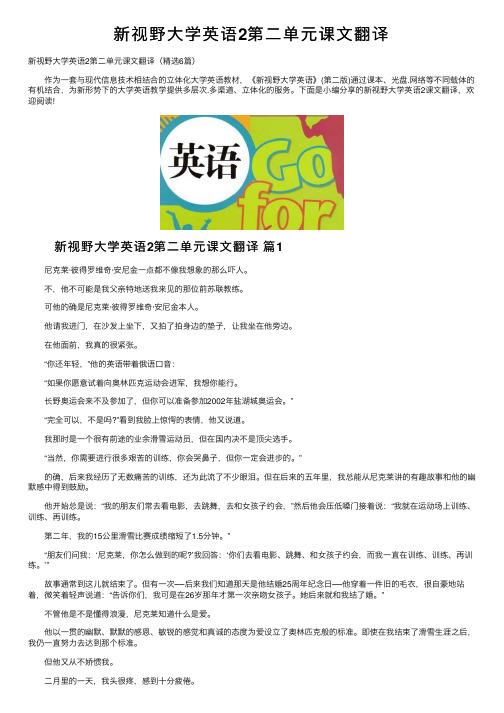
新视野⼤学英语2第⼆单元课⽂翻译新视野⼤学英语2第⼆单元课⽂翻译(精选6篇) 作为⼀套与现代信息技术相结合的⽴体化⼤学英语教材,《新视野⼤学英语》(第⼆版)通过课本、光盘.⽹络等不同载体的有机结合,为新形势下的⼤学英语教学提供多层次.多渠道、⽴体化的服务。
下⾯是⼩编分享的新视野⼤学英语2课⽂翻译,欢迎阅读! 新视野⼤学英语2第⼆单元课⽂翻译篇1 尼克莱·彼得罗维奇·安尼⾦⼀点都不像我想象的那么吓⼈。
不,他不可能是我⽗亲特地送我来见的那位前苏联教练。
可他的确是尼克莱·彼得罗维奇·安尼⾦本⼈。
他请我进门,在沙发上坐下,⼜拍了拍⾝边的垫⼦,让我坐在他旁边。
在他⾯前,我真的很紧张。
“你还年轻,”他的英语带着俄语⼝⾳: “如果你愿意试着向奥林匹克运动会进军,我想你能⾏。
长野奥运会来不及参加了,但你可以准备参加2002年盐湖城奥运会。
” “完全可以,不是吗?”看到我脸上惊愕的表情,他⼜说道。
我那时是⼀个很有前途的业余滑雪运动员,但在国内决不是顶尖选⼿。
“当然,你需要进⾏很多艰苦的训练,你会哭⿐⼦,但你⼀定会进步的。
” 的确,后来我经历了⽆数痛苦的训练,还为此流了不少眼泪。
但在后来的五年⾥,我总能从尼克莱讲的有趣故事和他的幽默感中得到⿎励。
他开始总是说:“我的朋友们常去看电影,去跳舞,去和⼥孩⼦约会,”然后他会压低嗓门接着说:“我就在运动场上训练、训练、再训练。
第⼆年,我的15公⾥滑雪⽐赛成绩缩短了1.5分钟。
” “朋友们问我:‘尼克莱,你怎么做到的呢?’我回答:‘你们去看电影、跳舞、和⼥孩⼦约会,⽽我⼀直在训练、训练、再训练。
’” 故事通常到这⼉就结束了。
但有⼀次──后来我们知道那天是他结婚25周年纪念⽇──他穿着⼀件旧的⽑⾐,很⾃豪地站着,微笑着轻声说道:“告诉你们,我可是在26岁那年才第⼀次亲吻⼥孩⼦。
她后来就和我结了婚。
” 不管他是不是懂得浪漫,尼克莱知道什么是爱。
大学英语综合教程2-UNIT-2

• 3 埃利奥特是退休护士,北卡罗来纳州达勒姆人。1993年,当她 终于捧读这些信件时,她被深深打动了。
6
7
Par. 4 When a family has a child.
• Frank M. Elliott, 23, who had left Georgetown University to join the Army in 1943, wrote from England. Pauline “Polly” Elliott, 24, wrote from their home in New Castle, Pa. Their daughter, DeRonda “Dee,” was a toddler.
• 8(诺曼底登陆前10天) • 1944年5月27日 • 嗨,亲爱的, • 跟你说吧,亲爱的,迪伊第一次去看电影,我当然想在她身边。带她去扬斯敦、匹兹堡或克利夫兰,去看看那些有着气派
大学英语Book 2 Unit 2课文
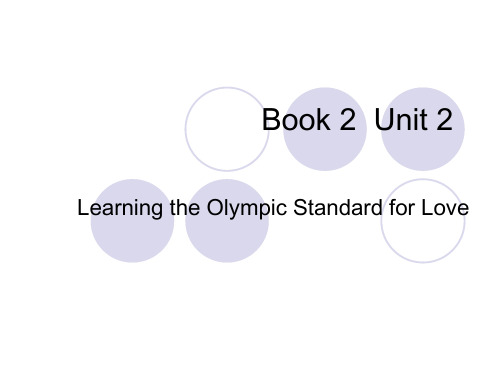
2
2
6. He never asked this of me again, nor did he take much notice of my outburst. (para.13)
take notice of: pay attention to She took little notice of his manner, good or bad. Translation: 老委员们对我说的话不予理会。 The old members of the committee took no notice of what I said.
General Statement: He never babied me. Supporting Details: I : massive headache; quite fatigue; going to die Nikolai : indifferent to my pain; … ski, ski, ski.
More
2
2
Notes to the Text—Focus Study
More expressions By no means
neither/little/only/hardly seldom not only not until under no circumstances no sooner ... than ... scarcely (hardly) ... when ...
2
2
3. I could always count on being encouraged by Nikolai’s amusing stories and sense of humor. (para.5)
count on: rely on; depend on Translation: 我以为我可以依赖家庭的支持,但是我错了。 I had thought I could count on the support of my family; but I was wrong. 经理需要一个可以信赖的助手,在他外出时,由助手负 责处理问题。 The manager needs an assistant that he can count on to take care of problems in his absence.
- 1、下载文档前请自行甄别文档内容的完整性,平台不提供额外的编辑、内容补充、找答案等附加服务。
- 2、"仅部分预览"的文档,不可在线预览部分如存在完整性等问题,可反馈申请退款(可完整预览的文档不适用该条件!)。
- 3、如文档侵犯您的权益,请联系客服反馈,我们会尽快为您处理(人工客服工作时间:9:00-18:30)。
Pre-Reading Questions
Questions for Discussion 1) Do you agree that men and women seldom mean the same things even when they use the same words? Are there any examples in your daily life that may support your point of view?
Because they recognized that they were different. They need to solve these problems.
2) What was one of the secrets of their success? (Para.1)
One of the secrets of their success was good communication.
4) How did Martians and Venusians understand the communication problems? (Para.3)
They assumed that it was just one of those expected misunderstandings and that with a little assistance they would surely understand each other.
—Usually, when people say something, they try to make themselves understood by expressing the literal meaning. But on some occasions, the same words can have different meanings. For example, when a woman falls in love, her words to her lover may imply something special. When she says that she feels cold, she might actually mean that it's time for the man to move closer to her. In that case, it is an invitation to the man to hold her hands, or to put his arms around her.
—In my opinion, those who speak the same language may express themselves differently because they have different personalities , likes and dislikes , or value systems . All these work together to lead to different personal styles or ways of communication.
Part Two: In-Class Reading>> Global Reading
3) How could Martians and Venusians communicate well even if they spoke different languages? (Para.2)
They pulled out their phrase dictionaries to uully or went to a translator for help.
Part Two: In-Class Reading>> Global Reading
2) Besides the gender differences, are there any other differences that may cause people to speak differently?
Part Two: In-Class Reading>> Global Reading
2) —I think, besides gender differences, differences in social position , education background , culture, occupation and age may also cause problems in understanding each other.
Part Two: In-Class Reading>> Global Reading
Questions to the Text
1)Why did Martians and Venusians encounter many problems with relationships when they first got together? (Para.1)
Part Two: In-Class Reading>> Global Reading
Sample
1) —Yes, I agree. Male speakers are more direct, and female speakers are more indirect or tactful.
Part Two: In-Class Reading>> Global Reading
Part Two: In-Class Reading>> Global Reading
5) Why do men and women seldom mean the same things even when they use the same words? (Para.4)
